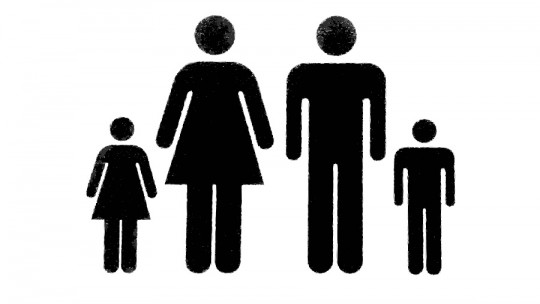
The family is our first context of socialization, the one in which we first learn to speak and understand language, and from which we inherit a whole series of cultural and behavioral elements that shape our personality.
However, it can also become a space that generates discomfort in us at any stage of our lives, something aggravated by the fact that in most cases these people are very important to us, due to what I have mentioned before. . We not only feel linked to these people because of custom and coexistence; In addition, we develop an emotional connection. Therefore, when we find ourselves immersed in a toxic family relationship, this is especially painful.
In this article you will find some Strategies that will be useful when overcoming a toxic relationship in the family environment taking into account that the first thing is your physical and mental health.
I have a toxic relationship with my family: what do I do?
Follow these tips to improve the coexistence and/or communication and dynamics of mutual support that you maintain with that part of the family with which you have a toxic relationship.
1. Establish if the line has been crossed that makes you a victim of abuse
First of all, it is essential that you stop to think about whether or not your position is that of a victim of abuse towards that part of the family with which you feel there is a problem. That is, if in the case of trying to improve the relationship with those people, you expose yourself to suffering mistreatment, either through physical violence or psychological violence.
The key is in focus on the present and what could happen in the near future based on what you know is happening today ; For example, many people have a bad relationship with their parents because in their generation it was common to hit children to try to educate them, but if this occurred decades ago, that does not have to mean that we continue to suffer violence today. day.
On the other hand, in the case of psychological abuse, it can be complex to determine whether or not you are a victim, among other things because in very conflictive family relationships it is relatively common for an exchange of unfair accusations, occasional insults, etc. to occur. That is, both opposing parties carry out actions that, seen as something individual, can be understood as treating the other badly.
What matters here is the globality of the relationship and specifically, these two aspects: if there is a clear power imbalance in which one of the parties clearly has more capacity to harm the other person and the latter is cornered by this and can only adopt a defensive role, for one hand, and whether the intensity and frequency of these attacks significantly damage the quality of life of the person who is defensive, on the other, or pose a threat to his or her integrity.
In the event that you determine that you are a victim of abuse, it is very important that you give up the attempt to improve your relationship with that member or group of family members and that you prioritize ensuring your physical and mental health first.
2. Accept the idea of having to apologize
Although toxic attitudes on the part of the other person are the first thing we realize when evaluating a relationship, we must not forget that even if unconsciously, they also we may have taken unfair actions that have caused unnecessary pain in that part of our family with which we want to reconcile.
Therefore, it is important that you reflect on what you have done, and analyze to what extent it was justified. If you have fallen into one or more of these harmful actions, assume that you should apologize, and that this is nothing bad nor does it imply being weak; On the contrary, it shows your ability to repair relationships. Now remember that an apology is not just a matter of words ; You must also express a sincere willingness to repair the damage caused, at least to the extent possible. This way you will show your commitment to making that link work.
3. Dedicate at least one talk to addressing the problem and proposing solutions
Although the process of overcoming a toxic family relationship takes time and must develop over weeks and months, at some point there needs to be a qualitative change in the way you approach that relationship. That is to say, a moment when it becomes clear that the way you interact and communicate is going to change This “starting from scratch” is a temporary reference that will motivate both parties to make an effort to improve the relationship, since you will have generated the expectations that this will happen.

If you don’t talk about a problem, it is impossible to solve it Sometimes in families the dynamic of silence is created and members learn to act in a passive-aggressive way. It’s time to break the cycle. Spend some time writing and organizing your feelings and when you get to the genuine cause of what is causing your discomfort, find a moment where you are all calm and calm so you can talk about it firmly and clearly. Your feelings matter.
So, set a date and time to have a serious talk in which, without rushing and without anything to distract you, you can talk about how you have felt, how you feel, and what you could do to improve that relationship through actions and routines that make a difference. This is also the time to apologize and show that you are both interested in regaining each other’s trust establishing goals that allow us to demonstrate that this commitment is there, it is not pure fiction.
This talk should serve three purposes: express your point of view and recognize the feelings of the other party, apologize and propose reparation measures, and set specific objectives that you commit to meeting in a certain period to overcome that toxic relationship.
4. Support the other party
Any change in routine is difficult, and it may become difficult not to “relapse” into meaningless discussions or inappropriate ways of communicating. Given this, it is important that before the conflict escalates again, the other party helps the person who has problems to keep their word, showing that He does it not from an attitude of reproach or moral superiority, but as a sign and interest in improving the relationship and hoping that the other person will do the same for you if you need that help.
For example, redirecting an argument toward constructive criticism instead of allowing it to become a fight, or helping the other person calm down, etc.
5. Go to psychotherapy
If nothing seems to work, the most effective solution will be go to psychological therapy
On the one hand, complicated or conflictive family relationships can be both the cause and the consequence of psychological alterations linked to poor mental health. On the other hand, it is not necessary to have developed a psychological disorder to go to a psychologist: family therapy is a context of professional intervention that can help a lot where communication or coexistence dynamics need to be improved, as well as to overcome conflicts that have remained entrenched for a long time and facilitate reconciliation to occur.
- You may be interested: “The 10 benefits of going to psychological therapy”
Are you looking for professional psychological assistance?
If you want psychotherapeutic support, I invite you to contact me.
My name is Leticia Martinez Val and I am a health psychologist specialized in caring for adults and adolescents. I work combining intervention strategies and techniques from cognitive-behavioral therapy, Mindfulness, Third Generation Therapies and systemic family therapy, and I offer in-person and video call sessions.








